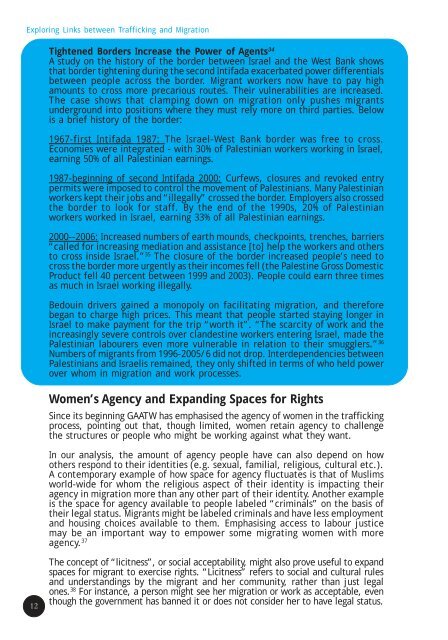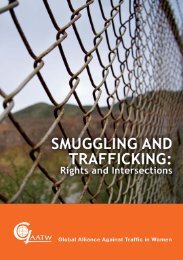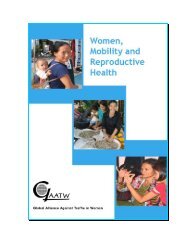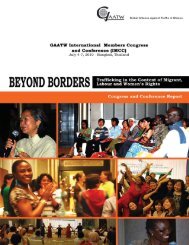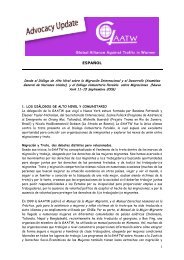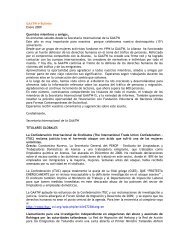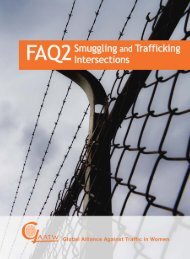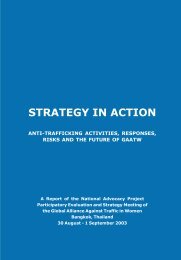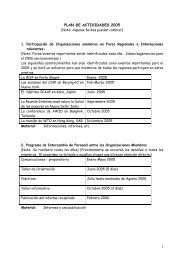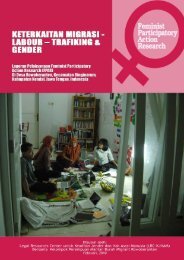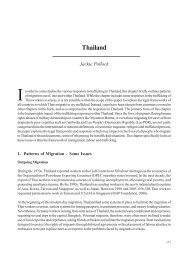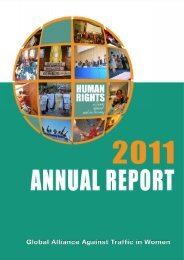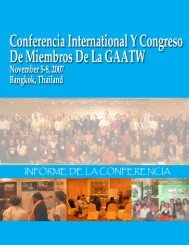Exploring Links between Trafficking and Migration - Global Alliance ...
Exploring Links between Trafficking and Migration - Global Alliance ...
Exploring Links between Trafficking and Migration - Global Alliance ...
- No tags were found...
Create successful ePaper yourself
Turn your PDF publications into a flip-book with our unique Google optimized e-Paper software.
<strong>Exploring</strong> <strong>Links</strong> <strong>between</strong> <strong>Trafficking</strong> <strong>and</strong> <strong>Migration</strong>Tightened Borders Increase the Power of Agents 34A study on the history of the border <strong>between</strong> Israel <strong>and</strong> the West Bank showsthat border tightening during the second Intifada exacerbated power differentials<strong>between</strong> people across the border. Migrant workers now have to pay highamounts to cross more precarious routes. Their vulnerabilities are increased.The case shows that clamping down on migration only pushes migrantsunderground into positions where they must rely more on third parties. Belowis a brief history of the border:1967-first Intifada 1987: The Israel-West Bank border was free to cross.Economies were integrated - with 30% of Palestinian workers working in Israel,earning 50% of all Palestinian earnings.1987-beginning of second Intifada 2000: Curfews, closures <strong>and</strong> revoked entrypermits were imposed to control the movement of Palestinians. Many Palestinianworkers kept their jobs <strong>and</strong> “illegally” crossed the border. Employers also crossedthe border to look for staff. By the end of the 1990s, 20% of Palestinianworkers worked in Israel, earning 33% of all Palestinian earnings.2000--2006: Increased numbers of earth mounds, checkpoints, trenches, barriers“called for increasing mediation <strong>and</strong> assistance [to] help the workers <strong>and</strong> othersto cross inside Israel.” 35 The closure of the border increased people’s need tocross the border more urgently as their incomes fell (the Palestine Gross DomesticProduct fell 40 percent <strong>between</strong> 1999 <strong>and</strong> 2003). People could earn three timesas much in Israel working illegally.Bedouin drivers gained a monopoly on facilitating migration, <strong>and</strong> thereforebegan to charge high prices. This meant that people started staying longer inIsrael to make payment for the trip “worth it”. “The scarcity of work <strong>and</strong> theincreasingly severe controls over cl<strong>and</strong>estine workers entering Israel, made thePalestinian labourers even more vulnerable in relation to their smugglers.” 36Numbers of migrants from 1996-2005/6 did not drop. Interdependencies <strong>between</strong>Palestinians <strong>and</strong> Israelis remained, they only shifted in terms of who held powerover whom in migration <strong>and</strong> work processes.Women’s Agency <strong>and</strong> Exp<strong>and</strong>ing Spaces for RightsSince its beginning GAATW has emphasised the agency of women in the traffickingprocess, pointing out that, though limited, women retain agency to challengethe structures or people who might be working against what they want.In our analysis, the amount of agency people have can also depend on howothers respond to their identities (e.g. sexual, familial, religious, cultural etc.).A contemporary example of how space for agency fluctuates is that of Muslimsworld-wide for whom the religious aspect of their identity is impacting theiragency in migration more than any other part of their identity. Another exampleis the space for agency available to people labeled “criminals” on the basis oftheir legal status. Migrants might be labeled criminals <strong>and</strong> have less employment<strong>and</strong> housing choices available to them. Emphasising access to labour justicemay be an important way to empower some migrating women with moreagency. 3712The concept of “licitness”, or social acceptability, might also prove useful to exp<strong>and</strong>spaces for migrant to exercise rights. “Licitness” refers to social <strong>and</strong> cultural rules<strong>and</strong> underst<strong>and</strong>ings by the migrant <strong>and</strong> her community, rather than just legalones. 38 For instance, a person might see her migration or work as acceptable, eventhough the government has banned it or does not consider her to have legal status.


